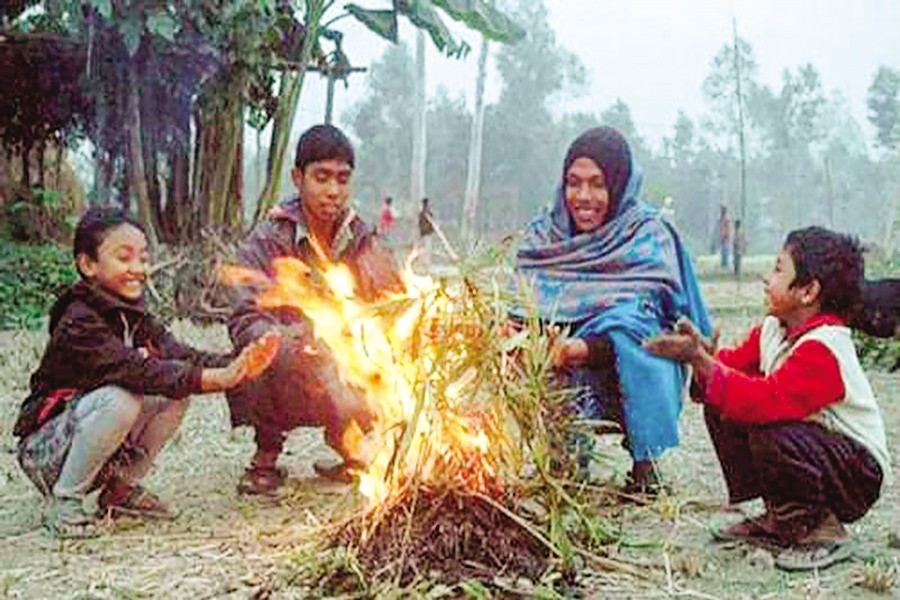
Published :
Updated :

On Tuesday morning last, temperature in Tentulia, the country's northern most point, was 14.5 degree Celsius. The indication is clear enough: winter has arrived and soon the country's middle and southern parts are gradually going to experience the fall of the mercury. The arrival of spring, king of seasons, is an occasion for celebration but winter is hardly welcome even though the season is not as biting as it was before. With the global warming, this tropical country has been experiencing at best mild winters for some years. Slight to moderate fluctuations of temperature with rare cold spells do not give people nightmarish days. Yet for the poor hapless people, some of whom are floating human beings in this capital city with no shelter on their heads, winters bring untold sufferings and misery.
How then are the countries, where winter is merciless, view the season? Usually, it is the poets and writers who give voice to the feeling of the general mass or unlock the hidden beauty of the world all around missed by the latter. Once the creative minds bring the unique quality of simple things to the common people's notice, the latter wonder why they did not give a closer look to discover the niche treasure of Nature!
Thus the resourceful minds find winter not at all hostile but highly rewarding. John Steinbeck, therefore, can declare, "What good is the warmth of summer, without the cold of winter to give it sweetness". Indeed, if there was no winter, summer's worth would go unappreciated. Notably, to the people in the West, summer was the most cherished season until recently. With the climate change, though, the mild and pleasant summer has started to be unbearable courtesy of growing sizzling heat. The charm of summer is vanishing fast and turning as punishing as that of a tropical country like Bangladesh.
Another American author George Raymond Richard Martin quotes his grandmother who used to say, "Summer friends will melt away like summer snows, but winter friends are friends forever". The message is clear: test of an enduring friendship is best proved through trial and tribulation, not when they join in the festive moments only. A Sanskrit shloka originating from Hitopadesha or Panchatantra, however, defines friendship in a more inclusive manner. It goes like this, "Utsave vyasane chaiva, durbhikshe rashtrabiplobe, rajadware smasane cha, ya tishthati se bandhaba". It is all comprehensive here. A true friend is one who stands by his comrade both in time of celebration and trouble or tribulation.
Although winter is not mentioned in the shloka (Sanskrit verse or hymn), the reference here is not just to the difficult time but also to the happy time friends share together. But George Martin's grandma used the winter figuratively to mean the troublesome time. So winter is associated with unhappy and difficult times in the West.
But in this part of the world, winter is disappearing fast. Yet whatever is left as its customary legacy can hardly be challenged. After all, this is the time when the Aman paddy is harvested. People in villages prepare for Nabanno festival. On reaping the fruit of their sweat, farmers are entitled to enjoy the treat. The season may be dull and drab but the secret of sweetness from the date trees they have long discovered make the Nabanno utsav special. Juice from date trees comes as a blessing to make their celebration many times more cherishing. The juice is one of the finest in the world and when it is heated to produce molasses at least in three different forms, the products become unparallel in taste, texture and flavour.
Villagers make 'pitha' (cakes) of various kinds not only to entertain their near and dear ones but also to keep alive a rich tradition. Happily, urban people have started appreciating the wintry gift and various organisations arrange 'pitha utsav' (indigenous cake festival). The new generations have shown their keen interest in such festivals. Although the festivals are highly successful, something of the rural ambience is missing. In villages, the oven-fresh treats become special because of the closeness of the entire effort to the soil. In urban setting also, the oven-fresh pithas are served but in a crowded place, the natural surrounding's ambience is missing. You cannot have the best of both worlds. Whatever of the old tradition is retained should be applauded. Thus the winter's treat becomes specially rewarding.


 For all latest news, follow The Financial Express Google News channel.
For all latest news, follow The Financial Express Google News channel.